-
The Benefits of Industrial Recycling
Almost all industrial processes produce waste, and much of this waste is reusable and recyclable. If your company produces industrial waste near Atlanta , a waste management company that specializes in industrial recycling can offer your company recycling tips that will help you reduce, reuse, and recycle your industrial waste. Here are some of the primary benefits of industrial recycling.
Save Money, Energy, and Resources
Recycling your company’s industrial byproducts and waste can save your company a lot of money by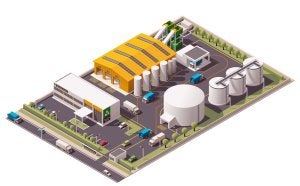 decreasing your disposal costs and material costs. A waste management company can advise you on how to reduce the amount of waste that your company generates, allowing you to spend less on waste disposal and recycling. They will provide analytical data and reporting and will help you improve your site logistics, which will allow you to manage your costs and reduce your overall expenses.
decreasing your disposal costs and material costs. A waste management company can advise you on how to reduce the amount of waste that your company generates, allowing you to spend less on waste disposal and recycling. They will provide analytical data and reporting and will help you improve your site logistics, which will allow you to manage your costs and reduce your overall expenses. Save Environmental Resources and Energy
Industrial recycling preserves the earth’s natural resources by decreasing the demand for new materials. Recycling also conserves energy by reducing greenhouse gas emissions and decreasing the demand for products made from manufacturing processes that are very energy intensive. For instance, scrap metal recycling reduces the energy requirements of manufacturing new tin and steel products by 60-70%. Recycling just one ton of steel eliminates the need to mine 2,500 pounds of iron ore and 1,400 pounds of coal.Increase Your Company’s Overall Value
In addition to saving your company money and helping you become more eco-friendly, industrial recycling also makes your company more valuable to customers and investors. As people become more aware of the increasing taxes and burdens we’re placing on the environment, they want to align themselves with environmentally friendly companies that are doing their part to conserve the earth’s natural resources. If your company implements sustainability programs, such as a zero waste initiative or an industrial recycling program, you can also become eligible for special programs and certifications. These programs and certifications can lead to new business opportunities, and increased savings for your company. -
Factors to Consider When Choosing a Dumpster Size
If you are considering a dumpster rental in Atlanta for your home or business, you may want some guidance on the size and type of dumpster you need. Dumpster rentals are typically available from waste management companies, and they come in a variety of sizes.
Before you rent a dumpster, watch this video for tips on choosing the right dumpster size. For small home remodeling or renovation projects, you won’t need a huge dumpster. For commercial construction or demolition projects, you will probably need to rent a rolloff dumpster. Watch the full clip for more advice.
-
Choosing a Waste Management Plan for Your Commercial Property
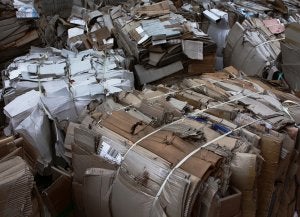 When you own a commercial property, you need a comprehensive waste management plan to prevent health and safety hazards, and maintain the appearance of your building. Waste management plans in Atlanta include recycling, dumpster rentals, trash pickup, and waste disposal. These services are necessary for your business to run smoothly and effectively. Here are some tips for choosing the right waste management plan for your commercial property.
When you own a commercial property, you need a comprehensive waste management plan to prevent health and safety hazards, and maintain the appearance of your building. Waste management plans in Atlanta include recycling, dumpster rentals, trash pickup, and waste disposal. These services are necessary for your business to run smoothly and effectively. Here are some tips for choosing the right waste management plan for your commercial property. Opt for Scheduled Trash Pickup and Waste Disposal
The most convenient element of any waste management program is a scheduled trash pickup and waste disposal service. Your waste management company will allow you to rent a dumpster, which will then be emptied by a trash company on a regular schedule, which is customized to meet your needs. For companies that produce a lot of waste, this service is invaluable, as it ensures that trash and refuse don’t build up and negatively affect the company’s appearance or reputationFind a Plan That Allows You to Reduce, Reuse, and Recycle
Recycling affords you company the opportunity to reduce waste, and reuse and recycle certain materials. A recycling center can handle paper, electronics, wood, scrap metal, cardboard, plastic recycling. Recycling bins should be placed around the building, and employees should be trained to understand what materials can be reused and recycled. A commercial recycling program benefits your company by cutting waste management costs, and allowing you to become more eco-friendly by reducing the unnecessary production of materials.Invest In a Waste Analytics Service
Waste analytics is a significant service that can save your company money. A comprehensive waste management plan should include data that can make your waste disposal services much more efficient. This data includes information about your waste production patterns, and the type of waste that is disposed of. Waste analytics services make it easier to schedule your trash pickup and modify your waste disposal practices so that you can reduce waste, reuse salvageable supplies, and recycle valuable materials. All of these tools will lower your waste management costs and have a positive environmental impact. -
Characterizing the Different Types of Industrial Waste
Industrial waste management in Atlanta is a crucial service for any business whose processes include manufacturing or production. Industrial activities produce a significant amount of waste, and without a comprehensive waste disposal program, the health and safety of your employees may be at risk. With so many different categories of industrial waste, it’s important to understand what materials can be reused and recycled, and how to properly manage and reduce waste disposal. Here are some facts about the different categories of industrial waste.
Chemical Waste
Chemical waste is typically generated by factories, processing centers, warehouses, and plants. This waste may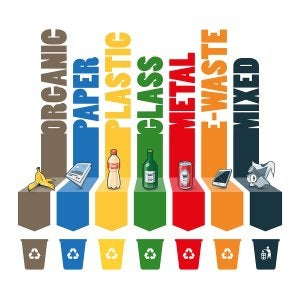 include harmful or dangerous chemicals and chemical residue, and waste disposal must adhere to careful guidelines. These guidelines are instituted and regulated by various government and environmental agencies, such as the Environmental Protection Agency, and the Occupational Safety and Health Administration. There are generally fines associated with non-compliance. Chemical waste must be segregated on-site, and waste disposal may need to be handled by a specialist to ensure compliance with health, safety, and legal requirements.
include harmful or dangerous chemicals and chemical residue, and waste disposal must adhere to careful guidelines. These guidelines are instituted and regulated by various government and environmental agencies, such as the Environmental Protection Agency, and the Occupational Safety and Health Administration. There are generally fines associated with non-compliance. Chemical waste must be segregated on-site, and waste disposal may need to be handled by a specialist to ensure compliance with health, safety, and legal requirements. Solid Waste
In industrial services, solid waste includes a variety of different materials, including paper, cardboard, plastics, packaging materials, wood, and scrap metal. Some of these materials can be reused and recycled by a recycling center. If you don’t have a comprehensive waste management plan that includes recycling, your waste disposal is not going to be as cost-effective or environmentally friendly as it could be. A recycling center can process the majority of industrial solid waste, effectively reducing your waste disposal costs.Toxic and Hazardous Waste
Toxic and hazardous waste is comprised of materials that can cause serious health and safety problems if waste disposal is not handled correctly. This type of waste typically includes dangerous byproducts materials generated by factories, farms, construction sites, laboratories, garages, hospitals, and certain production and manufacturing plants. The EPA and state departments regulate toxic and hazardous waste disposal. This waste disposal is only legal at special designated facilities around the country. -
A Look at How Compactors Work
If your company wants to begin recycling in Atlanta , you may benefit from using trash compactors. Trash compactors can help you reduce your waste, and recycle more efficiently, by cutting down on the need for garbage bags. Trash compactors do not take up much space, and are more efficient to use than other methods. Here is some helpful information about what trash compactors are, and how they work.
What is a Trash Compactor?
Trash compactors look somewhat like large metal dumpsters. They aid in waste disposal and recycling, and can
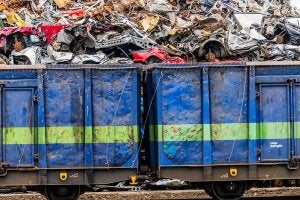 help households or companies reduce their waste and save money on labor costs. A trash compactor crushes trash into very small, manageable pieces using a metal ram. These pieces are then transferred to a trash compactor bag. The bag can then be picked up by a waste management company or trash removal company, which will take it to the dump or a recycling center.
help households or companies reduce their waste and save money on labor costs. A trash compactor crushes trash into very small, manageable pieces using a metal ram. These pieces are then transferred to a trash compactor bag. The bag can then be picked up by a waste management company or trash removal company, which will take it to the dump or a recycling center. Basic Compactor Operation
Compactors are very simple to operate. The metal dumpster has a bin that you open to throw trash or recyclables inside. Bottles should be placed into the bin first, and should be laid on their sides. Large pieces of garbage, including metal and cans, should be placed in the center of the trash compactor. Compactors have sensors that will alert you if you have loaded something into the bin incorrectly. Once the compactor is 50% full, you simply close the bin and press a button or flip a switch to start the compactor.
What Can You Put in a Trash Compactor?
Compactors are perfect for compressing recyclable materials before they are picked up by a waste management or recycling company. They are particularly helpful for scrap metal recycling, cardboard recycling, and plastic recycling. You should not put glass or chemicals into a trash compactor at any time. You can put food waste in a trash compactor, but the compactor will then need to be cleaned regularly to avoid odors.
-
A Look at the Demolition Process
If you work in construction, your company is probably using a waste management service to remove the waste that accumulates during the remodeling, construction, and demolition of buildings. A waste management company in Atlanta can provide you with roll off dumpsters and junk removal services that will make your jobs much more efficient.
Watch this video to see the demolition process in action at a building near the Kuala Lumpur city center. All of the waste that is generated by this demolition must be recycled or disposed of by a waste disposal company in a safe, eco-friendly manner.
-
A Look at Zero Waste Initiatives From Southern Waste and Recycling
At Southern Waste and Recycling, we understand that many companies want to reduce the expense of their waste removal services and decrease the amount of trash that ends up in landfills. We’ve made a commitment to helping our customers reach their goals via our Zero Waste to Landfill Initiatives. With more than 50% of the waste near Atlanta being buried in landfills, we believe these initiatives are very valuable.
Taking advantage of our sustainability models will help your company save money and be more eco-friendly.
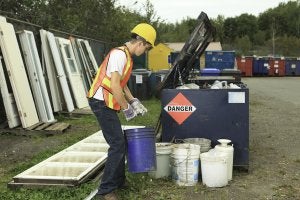 Adopting zero waste policies by recycling and eliminating sources of waste within your company can also make you more attractive to new customers and investors.
Adopting zero waste policies by recycling and eliminating sources of waste within your company can also make you more attractive to new customers and investors. Our services allow us to recycle more than 80% of our customer’s waste at our recycling center. We also return usable materials back to the economy while saving landfill space. These programs can save our customers up to 30% on their waste management costs. We can recycle a variety of materials, such as ferrous and non-ferrous metals, plastics, film, pallets, wood crates, electronics, mixed paper, and cardboard. We can even repurpose traditionally non-recyclable materials, such as food waste.
-
The Science Behind Landfills
Everyone produces trash, but not many people fully understand what happens to trash once it leaves their home and is picked up by a waste management company or recycling center. After trash pickup, your local trash company will take anything that isn’t sent to a recycling center or burned to a landfill. Keep reading if you’re interested in learning about the science behind landfills and waste management in Atlanta .
How Waste Disposal Works
Since 1960, the amount of waste that is produced in America has almost tripled, and the amount of trash that is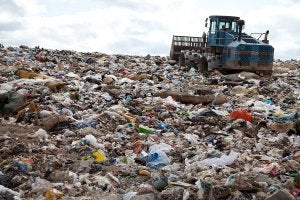 buried in landfills around the country has doubled. Waste disposal and recycling are handled by different waste management companies and recycling centers around the country, but the processes are essentially the same from state to state. According to HowStuffWorks.com , approximately 32.5% of all trash is sent to a recycling center, while 12.5% of trash is burned. The remaining 55% of America’s trash is sent to landfills.
buried in landfills around the country has doubled. Waste disposal and recycling are handled by different waste management companies and recycling centers around the country, but the processes are essentially the same from state to state. According to HowStuffWorks.com , approximately 32.5% of all trash is sent to a recycling center, while 12.5% of trash is burned. The remaining 55% of America’s trash is sent to landfills. The Difference Between a Dump and a Landfill
Trash companies can take trash to two different places for disposal: a dump or a landfill. A dump is a huge, open hole in the ground into which trash is placed. Dumps are open to the elements, and often provide shelter for various insects and animals. A landfill is a structure that is carefully designed to ensure that trash is buried in such a way that it will not infiltrate or pollute the ground or water supply. The purpose of a landfill is not to help trash decompose, but simply to bury it. Because landfills prevent trash from coming into contact with the air or other outside elements, the trash does not decompose. The top layer of dirt that covers the landfill is covered each day with 6 new inches of compacted soil to keep air and animals out. This soil is then planted with vegetation, such as grass, to prevent erosion. -
Know the Dos and Don’ts of Recycling
“Reduce, reuse, recycle” is an important mantra to keep in mind, but it is also important that you remember that not everything can be recycled. Recycling rules typically vary by city or area, and certain waste materials cannot be taken in; search the Internet to find out about your local recycling rules so you can make sure that the waste you recycle is indeed recyclable. It is also important to look out for companies that encourage you to participate in their recycling programs, despite the fact that their programs are still harmful to the environment . If you want to practice optimal commercial and industrial waste management techniques in order to keep your business environmentally
 friendly, the first step is always staying informed.
friendly, the first step is always staying informed. Reuse Creatively
Once you determine which items cannot be recycled, consider the first two aspects of the mantra: reduce and reuse. Avoid purchasing and using unrecyclable products in favor of greener alternatives. If you do decide to use products that cannot be recycled, consider how you can repurpose them before making the purchase. -
Step by Step: Reducing Your Business’s Carbon Footprint
 Whether you work for a large corporation or a local business, it’s important to evaluate how your company’s practices affect the environment. Your carbon footprint has an impact on the local environment and economy, and can be a part of a global effort to go green. To begin reducing your commercial carbon consumption, first evaluate your current practices to see which areas you should address. You might start small by encouraging responsible energy usage, or implement a recycling program to deal with your plastic, metal, paper, and other waste. Take a look at this infographic from a recycling center near Atlanta to learn more about what you can do to reduce your carbon consumption. Please share with your friends and colleagues.
Whether you work for a large corporation or a local business, it’s important to evaluate how your company’s practices affect the environment. Your carbon footprint has an impact on the local environment and economy, and can be a part of a global effort to go green. To begin reducing your commercial carbon consumption, first evaluate your current practices to see which areas you should address. You might start small by encouraging responsible energy usage, or implement a recycling program to deal with your plastic, metal, paper, and other waste. Take a look at this infographic from a recycling center near Atlanta to learn more about what you can do to reduce your carbon consumption. Please share with your friends and colleagues.
RECENT POSTS
categories
- Uncategorized
- Waste Management Atlanta
- Waste Disposal and Recycling
- Hazardous Waste Disposal
- Chemical waste removal
- solid waste removal
- R3 Program
- Sustainable Organizations
- Sustainable Waste Removal
- Commercial Waste Removal
- Materials Management Program
- Dumpster Rental
- Roll Off Dumpsters
- Construction Site Waste Removal
- Sustainability
- Recycling in Atlanta
- Industrial Recycling
- Industrial Waste Removal Services
- Southern Waste & Recycling
- Waste Removal Atlanta
- Waste Specialists
- Atlanta
- Infographic
- Front Load Dumpsters
- Rear Load Dumpsters
- Reusable Electronics
- Dump Truck Atlanta
- Recyclable Electronics
- Trash Compactors
- Recycling
- Recycling Program
- Office Recycling
- Metal Recycle
- Electronic Waste
